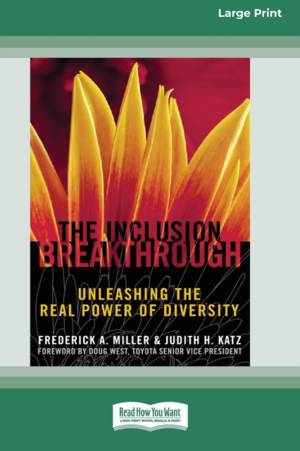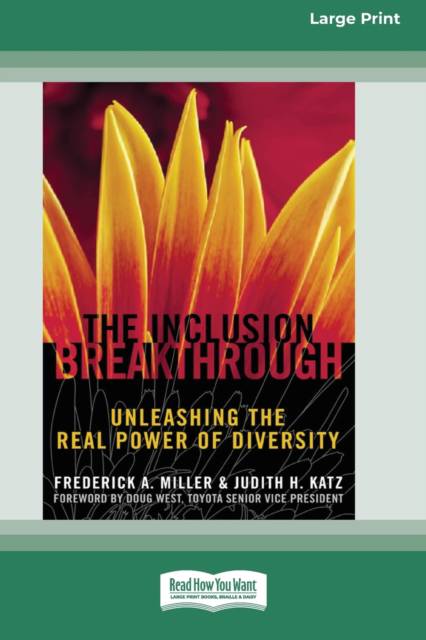
- Afhalen na 1 uur in een winkel met voorraad
- Gratis thuislevering in België vanaf € 30
- Ruim aanbod met 7 miljoen producten
- Afhalen na 1 uur in een winkel met voorraad
- Gratis thuislevering in België vanaf € 30
- Ruim aanbod met 7 miljoen producten
Zoeken
Inclusion Breakthrough
Unleashing the Real Power of Diversity [Standard Large Print 16 Pt Edition]
Frederick A Miller
Paperback | Engels
€ 58,45
+ 116 punten
Uitvoering
Omschrijving
Constant, continuing, and cataclysmic change is causing a major crisis within business organizations today. Faced with constantly advancing technology, unpredictable market shifts, intense global competition, and an increasingly independent ''free agent'' workforce, the only way for an organization to adapt and succeed is to build a ''culture of inclusion'' that nurtures and draws on the talents of a diverse workforce. Easy to say but hard to do; most organizations are mired in industrial revolution, static-world business models administered by monocultural, bordering-on-oppressive, ''command and control'' hierarchies. Organizations at risk include Fortune 500 giants, entrepreneurial start-ups, manufacturing and retail operations, government agencies, not-for-profits, educational institutions, and others. Most organizational change efforts-whether labeled as diversity efforts, re-engineering, right-sizing, or total-quality-management-are a waste of time, money, and human effort. Most produce more cynicism than results, and they can poison the waters for future change efforts. The Inclusion Breakthrough cuts a path through this potential minefield, offering a proven methodology for strategic organizational change, including models for diagnosing, planning, and implementing inclusion-focused, culture-change strategies tailored to each organization's individual needs. It also describes the key competencies for leading and sustaining a culture of inclusion. Offering real-world results of ''before and after'' surveys, including anecdotal and statistical reports of organizational change achieved using the methodologies described, The Inclusion Breakthrough presents an overview of current workplace conditions, attitudes, and policies based on interviews, surveys, and focus groups encompassing thousands of people in major organizations. The Inclusion Breakthrough demonstrates why the bottom line must be the central focus of any change strategy-and more importantly, how to carry that strategy out successfully.
Specificaties
Betrokkenen
- Auteur(s):
- Uitgeverij:
Inhoud
- Aantal bladzijden:
- 442
- Taal:
- Engels
Eigenschappen
- Productcode (EAN):
- 9780369307972
- Verschijningsdatum:
- 14/09/2010
- Uitvoering:
- Paperback
- Formaat:
- Trade paperback (VS)
- Afmetingen:
- 156 mm x 234 mm
- Gewicht:
- 553 g

Alleen bij Standaard Boekhandel
+ 116 punten op je klantenkaart van Standaard Boekhandel
Beoordelingen
We publiceren alleen reviews die voldoen aan de voorwaarden voor reviews. Bekijk onze voorwaarden voor reviews.











